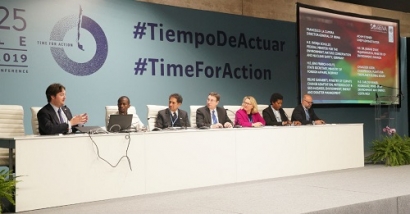
Action by countries to stop the continued progression of fossil fuels is possible, UNDP and IRENA said at a joint event held at the UN Climate Summit in Madrid.
Renewable energy deployment would have to accelerate six-fold by 2030 if the world is to achieve the goal of cutting global carbon emissions by 45 percent and keep temperatures below 1.5º Celsius above pre-industrial levels, IRENA said.
In September, UNDP launched a new initiative called the ‘Climate Promise’, vowing to support as many countries as possible to revise and submit enhanced climate pledges – known as Nationally Determined Contributions – or NDCs, by 2020.
Working with the NDC partnership and other partners, UNDP will support 100 countries to accelerate the enhancement of national climate pledges by 2020, building on its climate action portfolio in over 140 countries. Energy is a crucial part of this work and IRENA will provide the necessary knowledge, and support countries to accelerate energy transitions driven by renewable energy.
To date, 78 countries are drawing upon UNDP’s experience in disaster risk reduction, gender, health and nature-based solutions.
“Shifting to renewables will create far-reaching development impacts, triggering an economic stimulus and creating millions of jobs around the world, not to mention widespread health and other welfare benefits,” said Achim Steiner, the Administrator of UNDP.
“There is no sustainable development without renewable energy. It’s possible to accelerate the low-carbon energy transition and achieve sustainable development, thereby creating inclusive and prosperous economies,” Francesco La Camera, the Director-General of the International Renewable Energy Agency said at the Madrid Climate Summit.
In September, both partners launched a global campaign called #ItsPossible, engaging policy-makers and investors to join a push for renewables in countries around the world. The campaign will carry over into the next year.
During the joint event at COP25, IRENA also launched a new report ‘NDCs in 2020: Advancing Renewables in the Power Sector and Beyond’.

